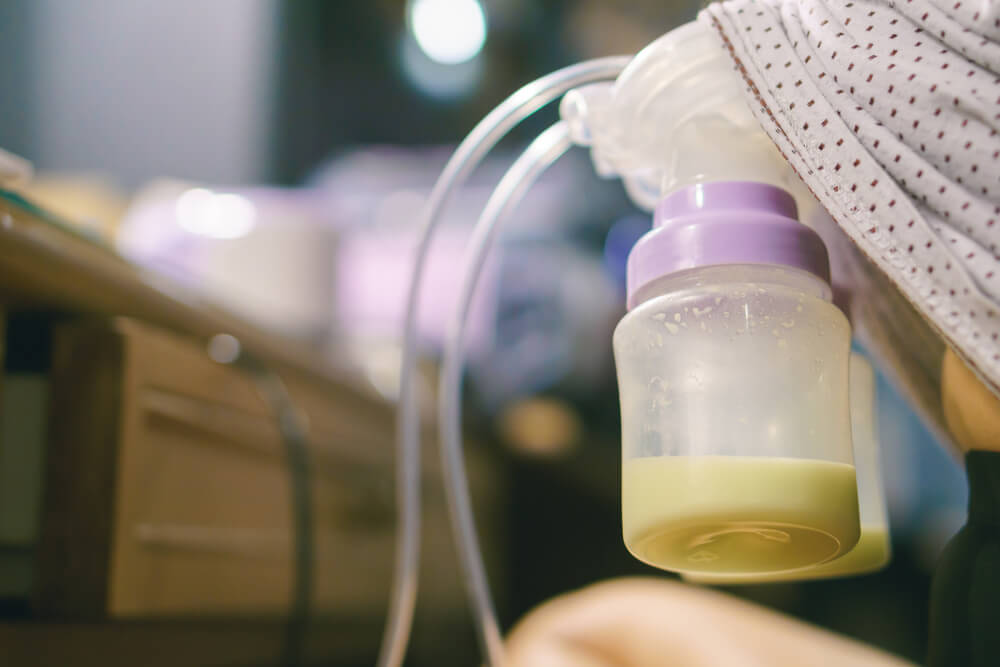Breastfeeding can be an incredibly rewarding and bonding experience for both mother and baby. However, some mothers face challenges in successfully breastfeeding their newborns due to low milk supply.
If you are at risk of having a low milk supply, it’s essential to know how to prepare for breastfeeding if you are at risk of low milk supply.
Understanding the potential factors contributing to low milk supply, such as certain medical conditions or insufficient breast stimulation, can help you identify signs of low milk supply early on.
This knowledge enables you to take proactive measures, like addressing your own health issues or seeking guidance from healthcare professionals, to boost your milk supply even before your baby arrives.
In addition to boosting your milk supply, it’s essential to have a support system in place and explore alternative feeding options if necessary.
Researching and preparing for potential breastfeeding problems can feel more confident and knowledgeable as you embark on this important journey with your little one.
Key Takeaways
- Recognize factors that may lead to low milk supply and address them proactively
- Consult healthcare professionals and seek support for a successful breastfeeding journey
- Be prepared with alternative feeding options in case of low milk supply
How To Prepare For Breastfeeding If You Are At Risk Of Low Milk Supply

When it comes to breastfeeding, it’s crucial for me to have a thorough understanding of my breast milk supply. The process of lactation and milk production is governed by the principle of supply and demand. In other words, my body will produce milk in response to the frequency and intensity of my baby’s feeding sessions.
If my baby feeds more frequently, my body will produce more milk to accommodate the increased demand.
Low milk supply can be a concern for some, but it’s important to note that milk production can be influenced by various factors. This includes mother-baby interaction, proper latch, and positioning during nursing.
In some cases, low milk supply can be attributed to medical reasons such as hormonal imbalances or previous breast surgeries. That’s why it is essential for me to closely monitor my milk supply and work closely with a lactation consultant to address any concerns promptly.
To support and maintain a healthy milk supply, I can take several proactive steps.
These include:
- Ensuring my baby is latching on correctly and breastfeeding frequently
- Practicing skin-to-skin contact with my baby
- Consuming a nutritious diet, staying hydrated, and getting enough rest
- Managing stress levels
- Seeking professional support from a lactation consultant or healthcare provider if needed
It’s vital to remember that fluctuations in milk supply are normal and can be influenced by numerous factors. By monitoring my milk supply, taking proactive steps, and seeking professional guidance, I can ensure that my baby receives the nutrition they need while also maintaining my own well-being throughout the breastfeeding journey.
Factors Contributing To Low Milk Supply
Medical Conditions
Several medical conditions can impact milk supply, including polycystic ovary syndrome, thyroid issues, and diabetes. These conditions may interfere with hormone production, which plays a crucial role in milk production.
Moreover, conditions like anemia and high blood pressure can also affect a mother’s overall health, indirectly impacting the milk supply. Also, a history of breast surgeries or breast cancer treatment may also cause complications in milk production.
Lifestyle Factors
As a breastfeeding mother, it’s essential to be aware of various lifestyle factors that can contribute to a low milk supply. Inadequate rest, poor sleep, and significant stress are some potential causes of lower milk production.
Equally, smoking and alcohol consumption can negatively affect milk supply, with the toxins from smoke and alcohol passing into the breast milk. Proper nutrition and hydration are also crucial in maintaining milk supply, so a healthy diet and adequate water intake should be priorities.
Breastfeeding Techniques
Breastfeeding techniques play a significant role in ensuring a healthy milk supply. Early and frequent skin-to-skin contact helps stimulate milk production, while different breastfeeding positions may assist in achieving a proper latch.
In cases where tongue-tie or premature birth are factors, it may be more challenging to get a good latch, leading to decreased milk supply.
It is essential to avoid introducing solid foods too early, as it might reduce the demand for breast milk, causing a decline in milk production. Ensuring a proper latch, with the baby’s mouth covering most of the areola and a comfortable position for both mother and baby, will encourage the baby to nurse correctly and stimulate milk production.
Identifying Signs Of Low Milk Supply

As a new mother, it can be challenging to determine if I am producing enough milk for my baby. Yet, there are some clear indicators that can help me identify signs of low milk supply.
One crucial sign is my baby’s weight gain. If my baby is not gaining weight adequately, this could be an indication of insufficient milk supply. Babies should ideally gain about an ounce per day during the first few months of life, and if this is not happening, it is essential to consult with a healthcare professional.
Another key indicator is the number of wet diapers my baby has per day. A healthy and well-fed baby should have at least 5-6 wet diapers per day during the first few weeks of life. If the number of wet diapers is lower than this, it might be a sign that my baby is not getting enough milk.
In addition to the wet diapers, I should also look out for dirty diapers. My baby should have at least 3-4 dirty diapers, which indicate that they are getting enough to eat and are processing the nutrients in the breast milk.
The frequency and duration of breastfeeding sessions can also hint at potential issues with milk supply. If I find myself needing to feed my baby more frequently than every 2-3 hours or my baby seems unsatisfied after feedings, this might be due to low milk supply.
Cluster feeding, where my baby feeds more frequently and for longer periods in some parts of the day, can be a normal occurrence. However, if cluster feeding persists without significant breaks, it may indicate low milk production.
Observing my baby during feedings is also important. If my baby is not swallowing at regular intervals or seems to be fussing and discontent during breastfeeding sessions, these could be signs that they are not receiving an adequate amount of milk.
Lastly, I should be mindful of certain health conditions that might be related to low milk supply, such as jaundice and colic. If my baby is exhibiting symptoms of these conditions, I should consult with a healthcare professional to determine if low milk supply is a contributing factor.
Watching for these signs will give me a better understanding if my milk supply is sufficient to meet my baby’s nutritional needs.
Boosting Your Milk Supply
Breastfeeding More Often
To increase my milk supply, I will breastfeed more often. This is because the more I breastfeed, the more my body will produce milk to match the demand. Whenever my baby shows signs of hunger, I will make sure to offer the breast, even if it has been a relatively short time since the last feeding.
I will also try to respond to my baby’s growth spurts by increasing the frequency of feedings.
Hand Expressing
I can also use hand expressions to help boost my milk supply. Gently massaging my breasts and manually expressing milk, either into a container or a clean cloth, can encourage my body to produce more. Further, hand expression can be beneficial before latching my baby to encourage the let-down of milk and make it easier for my baby to latch on.
Using A Breast Pump
Using a breast pump can also increase milk supply. Similar to breastfeeding and hand expressing, pumping mimics the demand for milk and signals my body to produce more. It’s important to use a high-quality, double-electric breast pump and find the right fit for flanges to maximize milk output.
Pumping sessions should be scheduled between or after breastfeeding sessions.
Nutritional Supplements
There are certain nutritional supplements, known as galactagogues, that may help increase milk supply. One example is fenugreek, which can be taken as a supplement, tea, or included in my diet through various recipes.
Before taking any supplements, I should consult with my lactation consultant or pediatrician to ensure that they are safe for me and my baby.
| Supplement | Instructions |
|---|---|
| Fenugreek | Follow the recommended dosage on supplement packaging or consult with a healthcare professional. |
Hydration And Nutrition
Staying well-hydrated and maintaining a balanced diet is crucial for my overall health and milk production. I will be sure to drink plenty of fluids, especially water, and consume nutrient-dense foods to provide the necessary energy to produce milk.
Avoiding excessive caffeine and alcohol consumption is important, as these substances can negatively impact my milk supply.
In conclusion, I will take various steps to boost my low milk supply, including breastfeeding more often, hand expressing, using a breast pump, considering nutritional supplements, and maintaining good hydration and nutrition.
Seeking the guidance of a lactation consultant or pediatrician can provide further personalized assistance and advice.
Consulting Healthcare Professionals

Lactation Consultants
In my journey to prepare for breastfeeding, I found that seeking the advice of a lactation consultant is crucial. These experts specialize in breastfeeding and can provide valuable guidance about techniques and positions that promote effective milk production.
As a certified lactation consultant, they have the necessary skills and knowledge to address my concerns and uncertainties related to low milk supply.
A lactation consultant can conduct a thorough assessment of my breastfeeding situation, considering factors such as medical history and potential barriers to successful breastfeeding. It’s also possible to find lactation consultants in hospitals, helping new mothers with breastfeeding right after delivery.
Pediatricians
Another important professional in my breastfeeding journey is the pediatrician. They specialize in the health and development of infants and can monitor the growth of my baby during the breastfeeding period. The pediatrician can assist me in ensuring that my baby is getting adequate nutrition and addressing any concerns related to weight gain or feeding issues that might indicate a low milk supply.
Because breastfeeding problems can affect the health of both the mother and the child, keeping an open line of communication with the pediatrician is essential. They can provide me with helpful information on various feeding options, if necessary, as well as address potential medical issues related to low milk supply.
General Practitioners
In managing my overall health and well-being as a breastfeeding mother, I turned to my general practitioner for support. General practitioners are medical doctors with a broad understanding of various health issues and can help me determine if there are any underlying medical conditions contributing to my low milk supply.
Having regular checkups enables me to discuss any health concerns and receive appropriate treatment if necessary.
By maintaining a strong relationship with my general practitioner, I can be better prepared to face any challenges that might arise during breastfeeding and ensure the best possible health outcomes for my baby and myself.
Alternative Feeding Options
Baby Formula
If you’re at risk of having a low milk supply, it’s important to have alternative feeding options prepared for your baby. One common option is infant formula. Although breastfeeding is the most natural way to feed your baby, formula provides a safe and healthy alternative when breastfeeding isn’t possible.
There are various types of formula available, including cow’s milk-based, soy-based, and hypoallergenic options. It’s essential to choose a formula that meets your baby’s nutritional needs. You can consult with your pediatrician to determine the best formula for your child.
Solid Foods
Another alternative feeding option is introducing solid foods to your baby’s diet. This is typically recommended when your baby is around six months old. Starting solids too early can be harmful to your baby’s digestive system, and it’s important to wait until they have developed enough to handle solid foods.
While leaning on solid foods for nutrition, it’s crucial to include a variety of fruits, vegetables, grains, and proteins in your baby’s diet. Keep in mind that it’s essential to introduce one food at a time, as it allows you to monitor any allergies or sensitivities your child may have towards certain foods.
By exploring these alternative feeding options, you can ensure that your baby receives the necessary nutrition and stays on track with their growth and development. Don’t hesitate to consult your pediatrician for their expert recommendations on your baby’s feeding journey.
Remember, each child is unique, and you know your baby best.
Preparing For Potential Problems

Issues With Breastfeeding Equipment
As I prepared for breastfeeding, I came across various equipment that could help me cope with potentially low milk supply. One such piece of equipment was an electric pump. I found that, when used properly, it could help me increase my milk supply by stimulating my breasts.
Regardless, it was essential that I read user manuals and seek advice from my healthcare provider in order to know how to use it correctly.
I also discovered that issues such as poor latch, nipple confusion, or an uncomfortable nursing position could diminish my milk supply. As a result, I took time to find and invest in the right breastfeeding pillows, nursing bras, and nipple shields that would best suit my needs.
Breast Surgeries And Complications
Having had breast surgery in the past, I knew that there was a possibility of low milk supply or other complications during breastfeeding. I made sure to discuss possible risks with my healthcare provider, who suggested a thorough evaluation to understand the extent of the surgery’s impact.
This could include a breast mass or the need for a breast biopsy. My healthcare provider and I determined a plan of action in case complications arose.
Weaning Problems
Weaning can be another challenge if a mother is at risk of low milk supply. While doing research, I found out that the keys to successful weaning are the gradual introduction of new foods, patience, and flexibility.
I decided to choose a comfortable weaning pace and be open to adjustments as needed, always keeping my baby’s needs as a top priority.
By paying attention to my body and my baby’s feeding needs, I felt confident navigating potential issues and ensuring healthy breastfeeding, even with the risk of low milk supply.
Ultimately, a strong support system, clear communication, and willingness to adapt were crucial factors in my success.
Seeking Support

Breastfeeding Support Groups
I strongly recommend joining breastfeeding support groups, as they can be an invaluable source of information and encouragement. They provide a safe and comfortable environment where I can share my experience, ask questions, and learn from others facing similar challenges.
There are numerous online and local groups, such as La Leche League and Breastfeeding USA. Attending meetings or participating in online forums will help me build confidence in my breastfeeding abilities and find solutions for any issues that may arise.
Family And Friends
In addition to support groups, family and friends play an essential role in my breastfeeding journey. They can provide emotional support and encouragement, as well as practical help in caring for my baby so I can focus on establishing a strong milk supply.
It’s crucial to communicate with my loved ones about my intentions to breastfeed and the possible challenges I might face due to low milk supply risks.
Having a knowledgeable friend or family member who successfully breastfed their babies can be a great asset. They can share their insights and offer tips on how they overcame their breastfeeding struggles. If I lack such a support network, hiring a lactation consultant or a breastfeeding specialist can be worth considering.
These professionals can give me one-on-one guidance tailored to my unique situation.
Frequently Asked Questions
What are the signs of low milk supply in the early weeks after birth?
In the early weeks after giving birth, you might notice some signs that indicate a low milk supply. These can include your baby not gaining enough weight, feeding for prolonged periods, appearing unsatisfied or fussy after feeding, and possibly having fewer wet diapers per day.
How can I increase breast milk production before my baby is born?
To prepare your body for breastfeeding and ensure a healthy milk supply, you can focus on maintaining a nutritious diet and staying well-hydrated during pregnancy. Additionally, frequent physical contact with your baby right after birth, such as skin-to-skin care, may help to stimulate milk production.
How can I boost my milk supply immediately after noticing a decrease?
If you notice a decrease in your milk supply, try increasing the frequency of nursing sessions or pumping between feedings. Also, ensure you are practicing proper latch techniques and remaining well-hydrated. You can consult a lactation consultant for personalized advice and support.
Can I still raise my milk supply after it’s been low for several months?
Yes, it is possible to raise your milk supply even after it has been low for a few months. You can try nursing or pumping more frequently, using breast massage and compression techniques, and staying well-hydrated. Consulting with a lactation expert can also help you create a tailored plan to increase your milk supply.
What should I do if I struggle to produce enough breast milk for my baby?
If you are having difficulty producing enough milk for your baby, consider reaching out to a lactation consultant or healthcare provider for specialized guidance. They can help evaluate your individual situation and determine the most effective steps to take, which may include nursing or pumping more frequently, making dietary changes, and addressing any underlying health issues.
How can I prepare my body for breastfeeding while I’m still pregnant?
To prepare your body for breastfeeding, you can focus on maintaining a healthy and balanced diet, staying well-hydrated, and building a strong support system of family, friends, and healthcare professionals.
Furthermore, it is helpful to familiarize yourself with breastfeeding techniques and resources, such as books, online articles, and lactation classes, to have a better understanding of the breastfeeding journey once your baby arrives.














